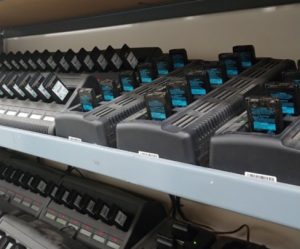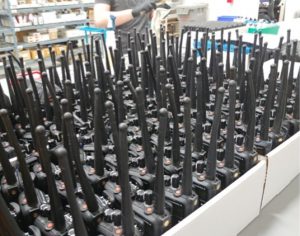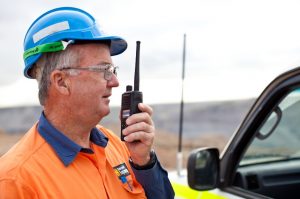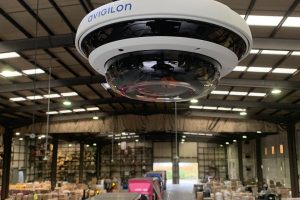Getting ready for a shutdown?
Contact Us, and we’ll take care of your communications needs.
When large facilities shut down for maintenance in Alberta, it can be one of the busiest times of the year. There are dozens if not hundreds of employees and contractors working on-site, and it should come as no surprise. Simply drive past any large-scale facility in Edmonton or Fort McMurray, and you can understand that operating a refinery or a mill is incredibly expensive. Every hour of downtime translates to lost revenue.
That’s why maintenance work happens around the clock during a shutdown; facility managers are trying to get their operation back into production as soon as possible. And, if you’ve been through a shutdown, or even seen one delayed, you know how critical reliable, effective communications are.
Tridon has supported many facilities through successful shutdowns by providing top-tier communications solutions. Part of how we’ve done that is by asking our customers some key questions to ensure they get the right solution, the first time.
If you’d like to start a conversation, Contact Us. In the meantime, here are those questions, and some insight into why they matter.
How Many Radios Do You Need?
This first question may seem so obvious that it goes without saying, but there is still a bit to unpack. Remember – not everyone working on your facility during a shutdown will be your employee. Many will be contractors, there to perform a specific part of the project before leaving. You’ll need to decide if you’re providing radios for everyone on-site, or just the people who work for you.
If you go for the second option, be sure your contractors are using radios that are compatible with what is being used on site. Preparing a list of approved radios is the best way to ensure this.
What About Radio Accessories?
Headsets, speaker mics, holsters, spare batteries, gang chargers, and so on. You want to make sure your team has the supporting accessories they need to make communication effortless. Otherwise, your radio equipment could end up being a hindrance to safety and productivity. Don’t think that ‘accessories’ are just gimmicky add-ons. They do a lot to help your team stay safe, connected, and on task:
- Spare batteries will keep your team communicating through an extra-long shift
- Gang chargers will keep those spare batteries organized when they are not in use
- Headsets will protect hearing in loud environments, and provide one-way or two-way communication, depending on the model
- Speaker mics will allow your team to listen and respond to radio messages without having to stop work and unclip the radio from their belt
Granted, you don’t want to go overboard, buying or renting radio equipment you aren’t going to need. But trying to cut corners could leave you scrambling once the project starts. And while we’re on the subject of buying and renting…
Do You Want to Buy or Rent Your Radio Equipment?
Shutdowns can be large-scale projects, but they generally don’t last for more than a couple of months, and projects of that length are usually restricted to the oil and gas sector. Because of that, we generally recommend that our clients rent their two-way radio equipment rather than buy it. That way, the cost and hassle of storing and maintaining the equipment won’t fall on them.
The general rule of thumb? If you’re going to be using your radio equipment every day, you can easily justify the cost of a purchase. If the use is project-based, seriously consider renting radios instead of buying.
Do You Need Intrinsically Safe Radio Equipment?
The answer to this will depend entirely on the environment your team is working in. For example, if you’re shutting down one of Alberta’s provincial parks for maintenance, or a stretch of highway, then it’s highly unlikely. On the other hand, if your teams are working in refineries, pulp mills or utility plants, then expect intrinsically safer adios to be mandatory.
If you’ve used intrinsically safe (IS) radios, you know that there are several categories. The level of intrinsic safety you’ll end up needing will depend entirely on the project and job site. There are a great number of variables when it comes to determining the correct Class, Division, and Groups, and you need to get that right for communication to happen both safely and effectively.
If you find yourself getting lost in the weeds, don’t hesitate to Contact Us. Tridon’s Account Managers have years of experience working with IS technology, and they’re here to help.
Do You Have All of Your Frequency Licenses?
If you use two-way radios regularly, then you know that you need a license to use most of the frequencies on the RF spectrum in Canada. Make sure you stay on top of this, especially in the lead up to a major project; it will help ensure communication continues without interruption.
But remember that, during a maintenance shutdown, there could be dozens or even hundreds of people working at your facility. All of them will need to have radios and they’ll all need to use them. That kind of increased radio traffic could result in the kind of communication challenges (like longer waits for an open channel) that only serve to add delay and frustration to a job.
The solution? Get more frequencies. ISED (Innovation, Science and Economic Development Canada) licenses out frequencies on a short-term basis, meaning you can get the additional bandwidth your project needs dictate without being saddled with the additional licensing cost for an entire year.
What About Your Other Telecommunications Systems?
Mobile and portable radios aren’t the only way you keep your team safe and connected. You have video surveillance cameras monitoring key areas of your facility around the clock. You have access control systems securing restricted areas and, maybe most importantly, you have a public address and general alarms system that will be critical in an emergency.
As a full-service Telecommunications Systems Integrator, Tridon Communications is fully equipped to support and maintain these systems, and your regular maintenance cycle could be the ideal time to do so. If you’d like more information on the services we can provide, get in touch with us today.
Getting Started
Regardless of your industry – oil and gas, utilities, hospitality, public service, and so on – a shutdown for maintenance is a massive project. Every day it goes on represents lost revenue for your operation. That’s why planning for it is essential.
Tridon’s Account Managers and Service Technicians have years of experience supporting clients through shutdowns and that can be invaluable when it comes time to prepare for yours. If you’d like to get the ball rolling, just Contact Us. We’re here to help.
Tridon is a full solution Telecom Systems Integrator with CSA certification and licensed by APEGA. Our Engineering, Service and Tower Divisions collaborate with customers to build engineered solutions including communications systems design, tower inspections, and co-location, wireless broadband, fiber optic cabling, site security, and two-way radio communication.








